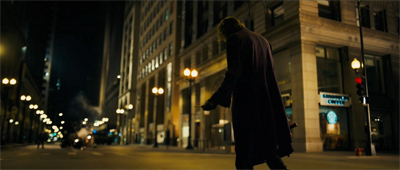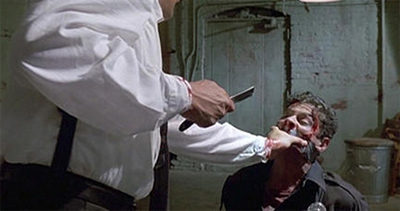It’s a clip that’s gone viral. Tarantino lashing out at Channel 4 interviewer Krishnan Guru-Murthy has become something of in internet touchstone. “I’m shutting your butt down,” the director protests after getting another of those inevitable questions about the link between movie violence and real-life violence. It’s cringeworthy and awkward, and it plays into Guru-Murthy’s hands better than a straight answer would have, but I can’t help but empathise with Tarantino’s position.
Incidents like the shooting in Aurora or Connecticut shooting are truly horrifying and very hard for us to contextualise. I can understand Tarantino not wanting to get into that debate, because it’s really not the place of anybody involved in cinema to talk about it. It’s arrogant for anybody with any film background to try to relate their work to it, and it’s negligent of any journalist to try to sensationalise a link between film violence and real violence when the real questions are tougher, more uncompromising and more uncomfortable than a quick jab at Tarantino.
I didn’t write anything about the shootings, because it’s not my place. There are thousands of other people with opinions and viewpoints more relevant to contribute to the discussion. And, it must be pointed out, those people are not film critics. We don’t hand over coverage of school shootings to teachers or political assassinations to politicians, but it seems that both of those horrific events have attracted a fair amount of criticism from both film writers and from regular journalists ready to point an accusing finger at films.
I was quite disappointed with the coverage of the Aurora shooting by news critics. The obvious tasteless extreme was the infamous “curse of Batman” article published in The Daily Mail, but more level heads made similarly ill-judged comments. Even the normally quite stoic and reasonable Donald Clarke was very quick to lash into the fans who had been making Rotten Tomatoes a living hell in the lead-up to the release of The Dark Knight Rises.
To return to my piece, the incident does also cause us to think more seriously about those critics who received death threats for daring to not like The Dark Knight Rises. In this territory, we tend to dismiss such ranting as so much hopeless waffle. In a country where assault rifles are freely available to lunatics such threats should not be so casually dismissed.
Not to dismiss such on-line nonsense, but I think it’s an entirely different debate. If every over-involved response-happy fanboy on the internet were a potential mass-murderer, then these sorts of incidents would be far more frequent than they are – which is, sadly, far too common. That’s not to defend their shameful conduct, but there is really no comparison between those impotent threats voiced by immature and underdeveloped fanatics on a public website and the actions of James Holmes.
Similarly, Anthony Lane in the New Yorker engaged in an act of victim-shaming, suggesting that a reasoned response to the atrocity might be to cancel all midnight screenings:
A modest proposal: could midnight screenings be suspended? First, for reasons of security; there are always troubled or idiotic souls who dream of fomenting repeats of a public disaster, though they seldom succeed. Second, because those screenings, starting when most people are in bed, often have a crazed and hallucinated air, which is all part of the game to those who enjoy them—anyone who has driven to a theatre to fetch teen-aged Harry Potter devotees, as they wander out in costume at three o’clock in the morning, can attest to that weary delirium—but which, right now, seems volatile, ominous, and redundant.
The problem with such logic should be obvious. If James Holmes couldn’t murder a bunch of people at a midnight screening, why wouldn’t we wait until a packed prime-time Friday night showing? Or, if the cinema was completely out of bounds to him, what’s to think he wouldn’t do it elsewhere?
This sort of thing simply isn’t within the frame of reference for a film journalist to cover. These are real people with real lives, and I think it’s a mistake for those who write about film for a living to weigh in on that sort of tragedy to offer their own opinion or viewpoint as anything more than a personal observation. It betrays a sense of arrogance to talk about the lost lives in the context of movies and cinema.
Truth be told, I can’t decide if Nikki Finke’s “very real possibility this terrifying tragedy may affect The Dark Knight Rises’ opening box” is better or worse than the pontificating about underlying causes and responses from other film writers. It’s tasteless, tacky, seedy and completely the wrong thing to say – but at least she’s not misrepresenting herself as some sort of social and political commentator. Indeed, arguably the most level-headed response came from Ali Gray at The Shiznit, suggesting:
Despite the simple facts of the matter – troubled person with guns commits murder – the media’s insistence on dubbing the shootings “The Batman Killings” or “The Dark Knight Massacre” cheapens the tragedy and is an insult to the families of those affected. The media’s insatiable appetite for a story they can package with something as recognisable as an icon like Batman only sidelines the victims, condemning them as a footnote to something as trivial as a film release.
The media’s response to the shootings was less than ideal, and part of that was in the volume of film critics and journalists ready to weigh in with an opinion or insight. However, in just about any form, asking film journalists to discuss this sort of atrocity avoids the real and pertinent questions that such repeated atrocities raise.
I didn’t write about Aurora because it’s not my place. All I can do is reiterate my sympathies to those who lost loved ones. Of course, you could accuse me of being a hypocrite – that writing about writing about Aurora is some sort of cheap cop out, but I felt I should outline my position. We say very stupid things about incidents that we can’t quite parse. However, there’s also a broader irresponsibility in the way that journalists in general have handled this sort of thing.
The meatier questions about gun violence – including issues of how to deal with the mentally ill, how people fail to notice ticking time bombs, how people like that get their hands on semi-automatic weaponry – are all very uncomfortable questions, because they imply some sort of broader social complicity. We don’t like to ask how we could have recognised James Holmes’ mental illness, because it implies we could have stopped it. It implies that there’s something fundamentally wrong in the way that we live and act, and in our social priorities.
And this is why – as much as Tarantino’s blowout response to Krishnan Guru-Murthy (“I am not your slave and you are not my master”) undermines his credibility – Quentin Tarantino’s position here is entirely right. Nobody’s saying that we shouldn’t ask questions about the films we produce and the films that we consume. We should ask these questions, and we have asked those questions. Tarantino’s response wasn’t a refusal to answer the question. It was a refusal to answer the question again and to keep answering the same question he had been responding to, in one form or another, for two decades.
“I’ve said everything I have to say about it,” he responded to the question. “If anyone cares what I have to say about it, they can Google me and they can look for 20 years what I have to say. But I haven’t changed my opinion one iota…” It’s a fair point. He has even responded directly to the Connecticut shooting. He has said his piece, he simply doesn’t want to be treated like some circus sideshow to something that he has already commented on. It isn’t as if Tarantino is running a long-term research firm investigating the point, and he’s getting new empirical feedback to report. Instead, he’s just stuck saying the same thing over and over again.
And I agree entirely. There’s something very seedy about that Channel 4 interview. Krishnan Guru-Murthy is a fine journalist, but he’s not a film reporter. He hosts the Channel 4 evening news. He also hosts a new show about foreign affairs. One might suspect an ambush when they send him to interview the ageing enfant terrible of cinema, director of an Oscar-nominated film. However, one would imagine that any credible news anchor and foreign affairs journalist would have a more crucial angle to follow on the shooting than the director of a film that just happens to be released at the same time.
This is old ground. He’s covered it since the release of Reservoir Dogs. He states here that he feels the same way. In all the press coverage for Django Unchained, he has reiterated that his opinion has not changed. There is literally nothing to be gained from discussing it – from even raising it. There are questions that should be asked, but they shouldn’t be directed at Tarantino, and they aren’t the same questions we asked him twenty years ago.
However, it’s sensationalist, and it sells. Look at how rapidly the video has gone viral. The internet is awash with opinion pieces about it, even this one here. I suspect it’s garnering far more coverage than anything that is more relevant to this sort of violence. Besides, even if you want to talk about the link between movie violence and real violence, Tarantino is hardly the most qualified to answer. He has an opinion he has shared and restated for two decades, but the people you need to ask are people with background in that sort of psychological field, not an Oscar-nominated director.
Of course, “college psychology professor with years of research lashes out at Krishnan Guru-Murthy” isn’t nearly as juicy a headline. And this is where, amid his jumbled and unstructured (and Tarantino-esque) ramble, Tarantino scores his points. He has already explained that he has answered this question. Guru-Murthy either hasn’t done his research (unlikely, given he’s a credible journalist), or he’s simply interested in getting a nice soundbyte that he already knows. “I just refuse to repeat myself over and over again because you want me to for you and your show. And your ratings.”
There is something very slimy and sensationalist about that approach to journalism. Guru-Murthy is not interested in “Tarantino responds to criticisms of film violence”, he wants “Tarantino responds to criticisms of film violence on my show“ – it’s crass and it’s tasteless and it’s lazy. There are countless other strings to pull at that are more closely related to the shootings and the violence, but none are as headline-friendly as “director of Oscar-nominated film says…”
It’s also a nice way to invite viewers to project their own feelings on to Tarantino in a way that frees us of any collective responsibility. Look at what happened to Piers Morgan when he dared to raise the issue of gun control. The public response was loud and overblown. He dared to say something that perhaps challenged his audience, while the interview with Tarantino is just a lazy attempt to distract away from far more pertinent (and prickly) questions.
Incidentally, and I won’t labour the point too heavily, Tarantino’s observations about the nature of the interview are correct. That publicity circuit is about selling the film, and it’s not an avenue for those sorts of questions. Given how the interview system works – it’s like speed-dating for film journalists and film makers – it’s not the best forum for that sort of discussion. It feels like a cheap short – it’s like attending the press launch of a cooking show to ask Jamie Oliver his opinion on social warfare payment.
I’ll spare you a big ramble about the failings of mainstream journalism, as you’re not hear to read that. However, Guru-Murthy could have learned something from his subject. Tarantino’s films are daring, provocative and challenging. They don’t present easy answers to the audience, and they don’t pander to our desire to scapegoat. Even Inglourious Basterds, Tarantino’s movie about Nazis, raised some challenging questions about cycles of violence and viewer complicity that dares to put the audience a bit on the spot.
In contrast, Guru-Murthy was just going for a cheap and easy headline. And he got it. So well done to him.
Filed under: Movies | Tagged: Academy Award, Anthony Lane, Channel 4, Daily Mail, Dark Knight Rises, Krishnan Guru-Murthy, London, Nikki Finke, People, quentin tarantino, tarantino, Violence and Abuse, women |





























What’s with this “It’s not my place” crap? Do you live in the world at all?
Krishnan Guru-Murthy was asking a perfectly reasonable question. But, being the piece of shit that he is, Quentin had no reasonable answer
http://fablog.ehrensteinland.com/2013/01/11/quentin-tarantino-has-a-cold/
It was a perfectly reasonable question, but one that has been asked countless times before. Tarantino’s response was less than ideal (what the hell was the “master/slave” thing?), but I empathise with his position. In a debate about violence in our society, we tend to fixate on violence in popular culture and miss the fact that there’s a difference.
What do the actions of James Holmes have to do with Christopher Nolan’s attempt to make a film, to the point where the media can feel free to dub them “The Dark Knight Shootings”? Why should Stanley Kubrick have to ask Warner Brothers to pull A Clockwork Orange from distribution in the United Kingdom because a few nutjobs claim that it inspires them to do terrible things?
It’s fair to ask these sorts questions about culpability in crimes, but to fixate on them seems a bit disingenuous. These questions presume guilt, as if he has to argue against a proposition that is reasonably easy to accept at face value – look at how it’s phrased (“how can you be so sure…”).
He’s been asked the question before, and he has answered it before. He could have responded (a lot) better, but I can understand how he is sick of the press trying to create a link between Django Unchained and an unrelated tragic shooting. It does feel like he’s being asked to dance to a particular tune.
I’m reluctant to comment on gun patrol in America at times like Aurora and Connecticut because I am not American. I am very familiar with its popular culture, I have been over a couple of times, but I’m hesitant to lecture them on how to cope with the aftermath of a tragedy like that. All I can do is offer my sympathy to the victims and their families. It seems a bit improper to use the occasion to tell them how to deal with it.
Of course there needs to be a debate about these tragedies. It’s a debate that really should involve Americans, and it’s not my place to stand as an outsider and judge how they conduct that discussion. (Particularly in a country that has an escalating (if still infinitely smaller) problem with gun violence.) If I lived in the States I’d feel more comfortable with criticising the gun laws at a time like that.
As it stands, it seems disrespectful for me to presume my opinion or insight on the matter is worth a damn in the scheme of things when the country is still reeling.
And of course, this bites me in the ass, because of crap like this, when it becomes clear what form of the discussion is going to take and that really gets me. Because we have a journalist like Guru-Murthy who is generally quite good at his job, barking up the tree that will give him the highest profile.
Sorry, that is my feeling on the matter.
Not entirely sure why Guru-Murthy was interviewing him in the first place. As he said in the interview, he’s a news reporter, not a film reporter. Pairing those two up was always a mismatch/disaster waiting to happen.
I watched that live on the TV and it made for uncomfortable watching 😀